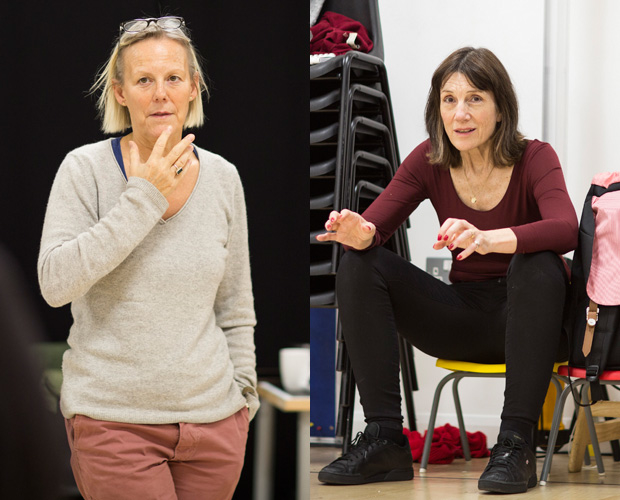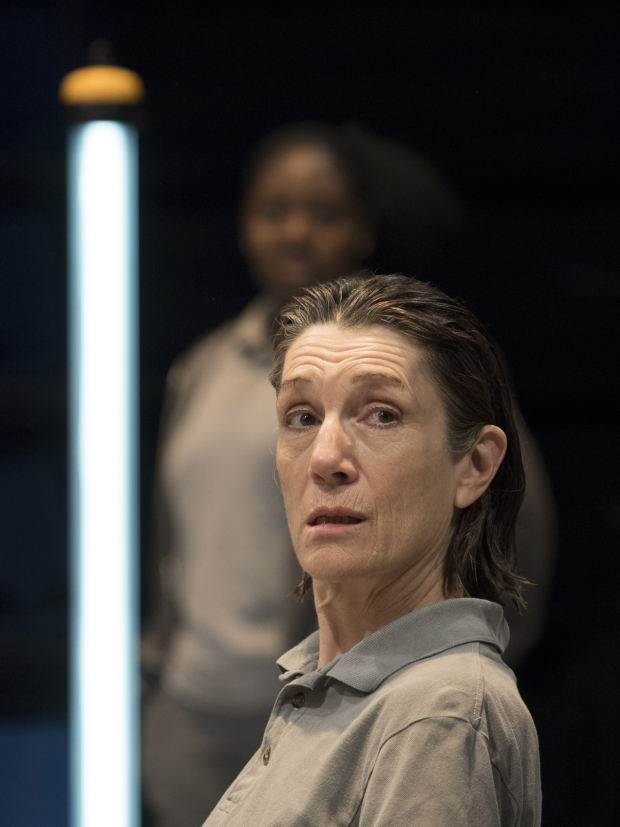Harriet Walter and Phyllida Lloyd on Giving Women Space to Breathe in Shakespeare
"It's been an immensely rich period for me, the last 10 years," said director Phyllida Lloyd of her decade-long collaboration with renowned British actress Harriet Walter. Over their time working together, the two artists have brought a revival of Mary Stuart from London's Donmar Warehouse to Broadway, created an all-female production of Julius Caesar that played on both sides of the Atlantic, and currently, are presenting an all-female Henry IV at Brooklyn's St. Ann's Warehouse.
Like its predecessor Julius Caesar, Henry IV is set in a women's prison, with each actor playing an inmate who is, in turn, playing a role (or two) within Shakespeare's play. Lloyd originally employed this unusual construct as a way to render the women androgynous in uniformly grey sweat suits, but the director says it has become "fundamental" to her and Walter's mission of opening up the world — especially the one created by Shakespeare — to all women.

(© Helen Maybanks)
How did the two of you begin working together to create these all-female productions of Shakespeare?
Harriet Walter: We were talking about the reduced opportunities for women, particularly older women, in the acting business…and it's an obvious step to make to say, "Well, why don't women play the men's roles in Shakespeare?" Because Shakespeare requires a certain skill set that is different from a naturalistic one…you don't have to be exactly like anybody else.
Phyllida Lloyd: The idea came to me when Josie Rourke, who ran the Donmar, asked me if I would be part of her opening season, and she said, "If you were, what would you produce?" and I said, "Well, something that makes the women in the audience feel included." Which within about 30 minutes escalated into an all-female production. And because Harriet and I had had such a fruitful journey on Mary Stuart…I began talking to her about what plays we might do. And in typical Harriet style, her mind was as much on what would be effective as a production and for a group of women as it was on what were her dream roles.
Harriet: My main barricade was a sort of coyness, a sort of, "I'm not entitled to do this. Who needs me to do this apart from me?" [But] it's about giving women access to our culture and our best poet's words and our history. It's just about allowing women of all age groups, colors, backgrounds, who speak the English language in whatever accent, to be permitted, suddenly, to say these wonderful, poetic, brilliant things and take action and go to battle.
Why did you decide to set these productions in a women's prison?
Phyllida: I proposed that we set [Julius Caesar] in a women's prison to render the women immediately androgynous, firstly, and secondly, to make sense of the diverse community of actors that we had brought together who, apart from Harriet, were, in many cases, people who you wouldn't have expected to see on the classical stage, because they were first, the wrong gender, then they were the wrong class, and then they were often the wrong race. And then the idea was to startle people when you saw them soar with the language.
Harriet: Setting it in a prison, we represent, if you like, all women. There are very many contrasting types of women on the stage and different people in the audience can identify with different people.

(© Pavel Antonov)
Why did you choose Henry IV for your second of these productions?
Phyllida: Just as Julius Caesar was a play about people obsessed by freedom and justice, we looked for another play that somehow spoke to women in prison. And we went to prison in the north of England and took this play, [which is] about reformation, about the sins of your past about conscience about a battle for space. And as soon as we shared the play with this group in prison, they all immediately grabbed it and said, this speaks to us so keenly.
Harriet: It's a fantastic play. I'd been in it and I'd played Lady Percy, and I'd sat in the wings thinking, "I have some wonderful stuff to say but I do it twice in six hours…" And I would sit there in the wings listening to this wonderful play and thinking, "This is a great play, but I am excluded from it, mostly."
What has resulted from these productions?
Harriet: I love the feedback we've gotten. In Shakespeare's plays mostly the women are there as a reflection or bolster or chider of a man — or the love interest, of course, in comedies, when they're young and beautiful and getting a husband. And then the play ends when they've got the husband. He never goes into the difficulties of marriage or the real world as it's going to happen for women. And so that, to 21st-century, or 20th-, or 19th-century audience, seems to be lacking a great deal. Because we've always used our greatest playwright as our tool for discussing humanity, whatever century we're in. We interpret him for our times. And I always say, to be or not to be that is the question for all of us. It's not just the question for a young man.
Phyllida: It reflected back to us the lack of entitlement that we all felt to take the space, to allow our voices to be heard. It felt like we were taking breaths the size of which we'd never taken before. And we needed these big breaths to command these vast speeches. To express the vision and ferocity of these statesmen and warriors needed a gargantuan energy, and the women found that they'd hitherto only been asked to use a tiny proportion of their energies onstage and were now finally getting to really spread their wings.

(© Pavel Antonov)











